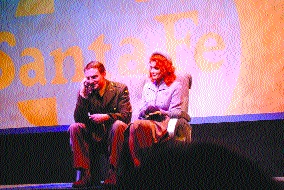By S. Clayton Moore

When Raleigh (Brett Aune) and May (Jessica Austgen) meet on a train in “Last Train To Nibroc,” it’s less than love at first sight.
Staunch Centennial supporters Anne and Chuck Aune can be proud of the wonderful performance achieved by their son, Brett Aune, in “Last Train to Nibroc,” recently presented at the Aurora Fox Arts Center.
Despite one of its protagonists being a drummed-out Army Air Corps recruit,
“Last Train to Nibroc” is less a soldier’s tale than a chronicle of a transformation more profound than a man changed by war. It’s a story of two young people who come together, go their separate ways, and then come back together as more tempered and passionate human beings.
Hosted in the charming atmosphere of the Aurora Fox Arts Center, specializing in smaller, character-driven pieces, and directed by Luannes Nunes de Char, “Last Train To Nibroc,” set in the early days of World War II, affords an interesting dichotomy between the charming and snappy introduction between two young lovers and their subsequent trials by fire.
Aune won the part of Raleigh, a cadet who has been summarily dismissed
from military service for what he colloquially calls “the fits.” While traveling on a train to New York City, he comes across May, played by Jessica Austgen. May is a young Kentucky girl on her way home, in shame, after being jilted by her fiancé in California.
Aune’s performance, wonderfully physical, reflected both his character and an underlying understanding of what movement means. Raleigh, with a quick wit and a keen eye, matched May’s spitfire temper blow for blow. As he and May verbally tussled while telling stories and the latest news from her hometown of Corbin, Ky., and his of nearby Woodbine, he jittered and jumped, his chronic twitch not only giving a sense of reality to the minimalist set, but also foreshadowing the menace of his medical condition.
May is a bit of a fussbudget, especially in the beginning. The playwright has given her an eerily accurate 1940’s sense of properness; she has plans to become a missionary. As she innocently reads her copy of a Christian pulp novel, entitled “Magnificent Obsession,” Raleigh is overcome with laughter. The beautiful Austgen has a tremendous sense of comic timing; her sharp tongue and scarlet hair gives the sense that she’s channeling Lucille Ball and Katherine Hepburn all at once.
It’s sad, though, to hear of May’s fiancé turning away from her country ways, to smoke, drink and otherwise carouse with the boys.
“People who go away change,” May says. “They’re not the same as from back home anymore.”
An interesting turn of the plot is based in reality as Raleigh explains to May that the famous authors Nathaniel West and F. Scott Fitzgerald are on the train.
“They are not,” exclaims Austgen. “I read in the paper that they both died just a few days ago.”
“They’re on the train,” deadpans Aune. “They’re in the baggage car.” In a clever and well-researched fact, West and Fitzgerald did die within a few days of each other in 1940 and their coffins were placed on the same train headed back east. May soon learns that the reason Raleigh is going to New York is because he is a writer. Still, she tries to convince him to return to Kentucky.
“Having a couple of fits won’t kill you, so why are you following dead men?” asks May.
May does convince him to return to Kentucky. We next see them, 18 months later, at the Nibroc (Corbin spelled backward) Festival, where May reveals that she has learned to drive, is teaching school, and is engaged to an itinerate preacher. Raleigh has gone to work on the Detroit auto lines, only to find that the lights of the factory trigger his epilepsy. As for Raleigh, his confidence has cracked while watching his buddies go off to war. A broken man, he is, as he says, “a prisoner in my own war.”
During this meeting, Raleigh and May give heated chase to each other’s fiery tempers until he cracks, and his anguished body is wracked by another epileptic fit.
Cut to 18 months later; Raleigh and May have finished having dinner with her parents. May’s fiancé has been killed and her brother shot down. As for Raleigh, he has spent some time in a Kentucky mental hospital, wrongly put there due to his epilepsy. May can’t get over how good Raleigh’s skin looks and constantly comments about it, until he realizes what has happened.
“It’s epilepsy, May,” he says as he doubles over with laughter. “It’s not leprosy.”
As Raleigh and May watch a distant lumber fire burn (cleverly represented by orange flickering lights and sound effects), they realize they have both come to love and need one another, warts and all. From the ashes, they’ve come through a terrible time in America’s history, not unscathed by their own fires, but tempered by them.
“We’re all sick on the inside,” says Raleigh. “Eventually it all shows on the outside—everything we’ve been through.”
“Nibroc” has ended its run, but if you have a chance to see this pair perform in further work, don’t miss the chance.
The Aurora Fox Theater Company will present Alan Ayckbourn’s “Comic Potential” from February 28 to March 30, and Howard Ashman’s “Little Shop of Horrors” from April 18 to May 18. The Aurora Fox Arts Center is located at 9900 E. Colfax Avenue, five blocks west of Havana.
For more information, call (303) 361-2910.










